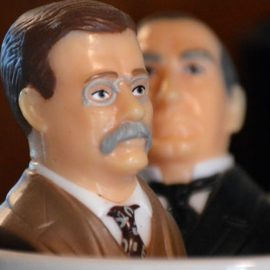

This article is an excerpt from the Shortform book guide to "Surely You're Joking, Mr. Feynman!" by Richard Feynman. Shortform has the world's best summaries and analyses of books you should be reading.
Like this article? Sign up for a free trial here.
What kind of freedom does Richard Feynman advocate in particular? What’s his opinion about rote learning? Why did he want to learn to draw?
Surely You’re Joking, Mr. Feynman! doesn’t take the form of a traditional autobiography. It’s a collection of Richard Feynman’s personal stories that give us a good look into the life of this extraordinary scientist and human being.
Keep reading to see several Surely You’re Joking, Mr. Feynman! quotes, along with context and explanation.
Surely You’re Joking, Mr. Feynman! Quotes
These five Surely You’re Joking, Mr. Feynman! quotes will give you a good idea of Feynman’s life and personality.
“So I have just one wish for you—the good luck to be somewhere where you are free to maintain the kind of integrity I have described, and where you do not feel forced by a need to maintain your position in the organization, or financial support, or so on, to lose your integrity. May you have that freedom.”
Feynman argues that understanding math and science requires a level of intellectual honesty that other fields lack. Feynman’s experience in the scientific world shines a light on the value of questioning others, questioning yourself, and having the integrity to admit when you’re wrong.
Feynman believes that good scientists must call attention to any possible doubt about their work. When reporting the results of an experiment or study, it’s crucial to acknowledge any variables, theories, or conditions that might call your conclusions into question. Questioning yourself is an essential part of overcoming your own bias.
Science, after all, is the process by which you can short-circuit bias to arrive at the truth, but Feynman says it’s every scientist’s job to make sure the system works as advertised.
“When it came time for me to give my talk on the subject, I started off by drawing an outline of the cat and began to name the various muscles.
The other students in the class interrupt me: ‘We know all that!’
‘Oh,’ I say, ‘you do? Then no wonder I can catch up with you so fast after you’ve had four years of biology.’ They had wasted all their time memorizing stuff like that, when it could be looked up in fifteen minutes.”
During a sabbatical year in Brazil in which Feynman taught science to prospective science teachers, he came across a peculiar phenomenon. His students appeared to have learned many scientific facts without understanding anything about them. When he pushed them to apply their knowledge through practical exercises, they couldn’t. He discovered that, previously, his students had learned by rote memorization in order to pass a standardized test. Feynman recalls being horrified that this was how future teachers were trained, and he said so during a lecture he gave to the Brazilian teaching establishment. He explained that passing tests isn’t the point of education. Without practical application, there can be no learning.
“I couldn’t claim that I was smarter than sixty-five other guys—but the average of sixty-five other guys, certainly!”
Feynman was so driven to solve problems that in school, he’d invent math puzzles for himself. This pushed him ahead of other students, who’d come to him with problems of their own. Feynman claims to have worked out many of the principles of trigonometry just for kicks and even invented his own form of mathematical notation because he didn’t like the ones used in his textbooks. All of this garnered him a reputation as a budding genius, a label that he frequently downplays, instead attributing his success to perseverance. He also says that, by approaching math and science as play, he worked out shortcuts to mathematical problems that made him seem smarter than he actually was.
“Learn what the rest of the world is like. The variety is worthwhile.”
One occasion when Feynman grabbed his chance at adventure was when he was invited to attend a scientific conference in Japan. He and his colleagues were put up in a western-style hotel, but Feynman felt like he was missing out on the authentic Japanese experience. To his hosts’ consternation, he pleaded to be housed at a traditional Japanese hotel, despite the hassle he’d create for himself getting to and from the conference. Feynman won out, changed hotels, and enjoyed his more genuine experience of Japanese culture so well that he returned to the country many times.
“I wanted very much to learn to draw, for a reason that I kept to myself.”
Later in life, Feynman’s curiosity led him toward projects even he’d never dreamed he’d consider—for instance, becoming an artist. He never believed that he had any aptitude, but he always imagined that art might be a way to express the sense of awe he felt about scientific discovery.

———End of Preview———
Like what you just read? Read the rest of the world's best book summary and analysis of Richard Feynman's "Surely You're Joking, Mr. Feynman!" at Shortform.
Here's what you'll find in our full Surely You're Joking, Mr. Feynman! summary:
- The memoir of award-winning scientist Richard Feynman
- A walk through Feynman's life, from college to winning the Nobel Prize
- Why enjoying life is just as valuable as your education






